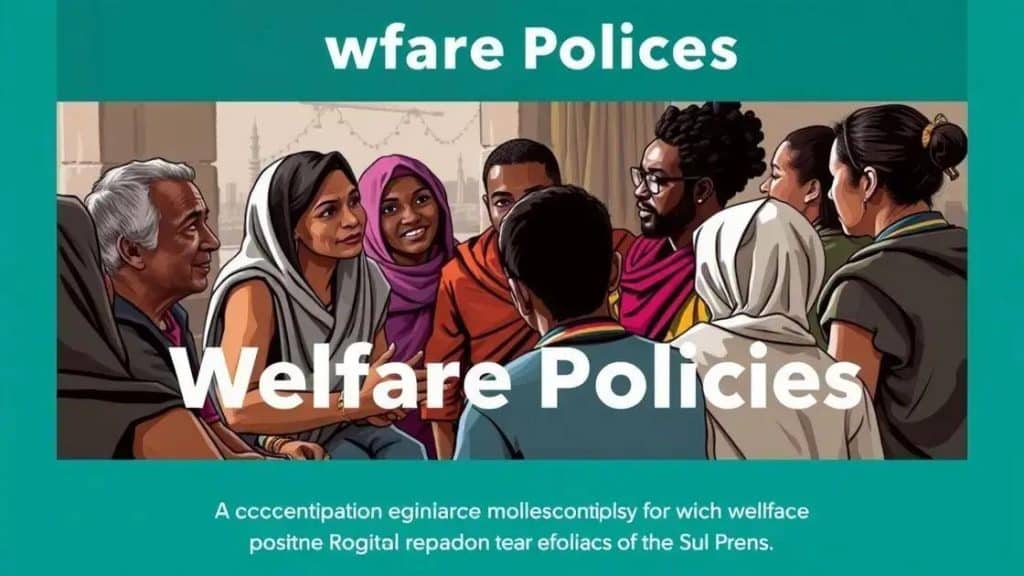Welfare work requirements spark intense debate on effectiveness

Anúncios
Welfare work requirements spark intense debate over their effectiveness, raising questions about the balance between encouraging employment and addressing the challenges faced by beneficiaries in accessing jobs.
Welfare work requirements spark intense debate about their role and impact in our society. Are these requirements truly beneficial, or do they create more hurdles for those in need? Let’s dive into the nuances of this complex topic.
Anúncios
Understanding welfare work requirements
Understanding welfare work requirements is crucial for grasping the ongoing debates surrounding welfare systems. These requirements aim to encourage recipients to seek employment, yet they also raise questions about efficacy and fairness.
The concept revolves around making welfare benefits contingent upon participation in work-related activities. This can include job training, volunteering, or actual employment. The idea is to not only support those in need but also to help them transition into the workforce.
Anúncios
Key Aspects of Welfare Work Requirements
Understanding the main elements that constitute these requirements can clarify their purpose and implications.
- Employment Mandates: Many programs require beneficiaries to engage in some form of work.
- Training Programs: Some initiatives focus on providing skills training to enhance employability.
- Time Limits: Restrictions on how long one can receive assistance are common.
- Exemptions: Certain groups may be exempt from these requirements, depending on their circumstances.
The debate surrounding these regulations often centers on whether they are effective in reducing poverty or if they inadvertently create obstacles for those who genuinely need help. Critics argue that they can lead to unnecessary hardships, especially for those facing barriers like childcare issues or health problems.
Supporters, on the other hand, argue that imposing work requirements encourages personal responsibility and self-sufficiency. This approach is seen as a way to break the cycle of poverty by motivating individuals to enter the workforce.
Benefits and Challenges
There are potential benefits and challenges that come with welfare work requirements. These include facilitating a sense of purpose for recipients and reducing dependency on government aid. However, challenges such as access to jobs or training programs remain significant concern points.
In summary, while welfare work requirements serve as a mechanism to encourage employment, the conversation about their effectiveness and fairness continues. It is an ongoing dialogue that highlights the complexities of welfare policies and their impact on society.
The impact on beneficiaries

The impact on beneficiaries of welfare work requirements can be profound and varied. These requirements can create challenges but also opportunities for individuals trying to improve their lives.
When people are required to work or participate in job training to receive benefits, they can experience a range of effects. Many find that these requirements motivate them to seek employment, helping them gain skills and confidence. However, others may struggle to meet these expectations, facing barriers such as childcare, health problems, or lack of job availability.
Positive Outcomes
There can be significant benefits for those who navigate the work requirements successfully.
- Increased Employment: Some beneficiaries secure jobs faster due to the pressure to meet work mandates.
- Skill Development: Job training programs enhance skills, making beneficiaries more marketable.
- Improved Self-Esteem: Gaining employment can boost confidence and self-worth.
On the other hand, the push for immediate compliance can lead to stress and anxiety for those who feel unprepared. Recipients may fear losing their only source of income, which can negatively impact their mental health. As these individuals try to meet the requirements, they might experience a sense of failure if they cannot secure a job quickly.
Challenges Faced by Beneficiaries
It is essential to recognize the obstacles that may prevent individuals from meeting work requirements.
- Childcare Issues: Parents may struggle with finding affordable care for their children.
- Transportation Barriers: Lack of reliable transportation can hinder job access.
- Health Concerns: Chronic health issues can limit employment options for some beneficiaries.
- Job Market Limitations: In many areas, jobs may not be available or suitable for all skill levels.
Balancing these requirements with personal circumstances can be considerably challenging. Some beneficiaries may find themselves caught in a cycle of stress, unable to meet demands while coping with everyday life. It’s crucial for policymakers to consider these challenges and find ways to support rather than punish those in need.
Debate on effectiveness and ethics
The debate on effectiveness and ethics of welfare work requirements is a critical conversation in policy discussions today. Many question whether these mandates truly serve the intended purpose of helping beneficiaries.
On one side of the debate, supporters argue that requiring work fosters independence. They believe that by encouraging individuals to gain employment, society can reduce dependency on government assistance. This perspective emphasizes the idea that work not only provides income but also instills a sense of responsibility and purpose.
Arguments in Favor
Proponents of welfare work requirements highlight several key points.
- Empowerment: Beneficiaries may feel more empowered when they engage in work.
- Economic Contribution: When individuals work, they contribute to the economy, which can benefit society overall.
- Skill Acquisition: Work requirements often lead to training opportunities that enhance job skills.
However, critics claim that these requirements can be unethical and counterproductive. They argue that imposing strict mandates on vulnerable populations often ignores the real barriers individuals face. Critics emphasize that not all beneficiaries can quickly find jobs due to systemic issues like lack of access to education, health problems, or insufficient job availability in certain areas.
Counterarguments
The ethical implications of forcing individuals into work can lead to serious dilemmas. Critics argue that these policies can harm those who are genuinely unable to comply due to their circumstances. This creates a potential cycle of poverty where individuals receive penalties for not meeting requirements.
- Accessibility Issues: There might not be enough jobs in a given area for everyone.
- Unintended Consequences: Pressuring individuals can lead to job displacement or underemployment.
- Mental Health Impact: The stress of meeting these requirements can worsen mental health for some beneficiaries.
Ultimately, the debate continues as advocates on both sides seek to redefine what effective welfare looks like. It raises fundamental questions about how societies can best support individuals in need while promoting responsible welfare policies.
Alternative approaches to welfare

Exploring alternative approaches to welfare presents new ideas aimed at improving the effectiveness and fairness of support systems. Many experts believe that innovative strategies could address the gaps often found in traditional welfare programs.
One promising alternative is the universal basic income (UBI) model. This approach provides all citizens with a regular, unconditional sum of money, regardless of their employment status. Advocates argue that UBI can reduce poverty while giving people the freedom to pursue education, training, or caregiving without the pressure of job-seeking.
Innovative Models
Several innovative models aim to enhance welfare effectiveness.
- Job Guarantee Programs: These ensure that everyone who wants to work has access to a job. This model can help eliminate unemployment and provide valuable job experience.
- Conditional Cash Transfers: This approach provides financial aid to low-income families on the condition that they meet specific requirements, like sending their children to school or getting regular health check-ups.
- Social Impact Bonds: In this model, private investors fund social programs and only receive a return on their investment if the programs meet established performance targets.
Each of these alternatives addresses different aspects of welfare. For instance, job guarantee programs aim to tackle unemployment directly, while conditional cash transfers can encourage behavior that benefits society, such as education and health maintenance.
Community-Based Solutions
Another approach focuses on community-level initiatives. Programs led by local organizations can offer tailored solutions that reflect the unique needs of their communities. These grassroots efforts often provide a more personalized support system, fostering a sense of agency among beneficiaries.
Moreover, collaborations between local governments and nonprofits can help create sustainable solutions to poverty. By pooling resources and expertise, these partnerships aim to address underlying issues that contribute to economic disadvantage, such as lack of access to quality education and employment opportunities.
FAQ – Questions about Welfare Work Requirements and Alternatives
What are welfare work requirements?
Welfare work requirements are mandates that individuals receive government assistance only if they participate in work-related activities like job training or employment.
How can universal basic income (UBI) help beneficiaries?
UBI can provide individuals with a regular income without conditions, allowing them the freedom to pursue education or caregiving without the pressure of job-seeking.
What are some alternative approaches to traditional welfare?
Alternative approaches include job guarantee programs, conditional cash transfers, and community-based solutions that cater to local needs.
Why is the debate on welfare effectiveness important?
This debate is crucial because it helps identify better ways to support individuals in need while fostering personal responsibility and enhancing overall societal well-being.





